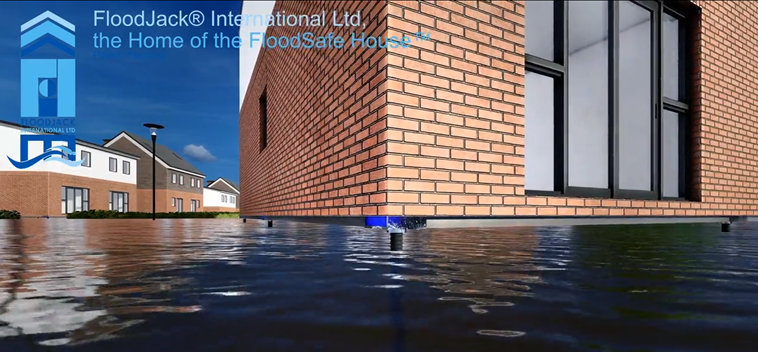
A multidisciplinary approach to a novel flood resilience project to improve user experience and mitigate event impacts for vulnerable residents.
The Flood Innovation Centre is just completing the delivery phase for an exciting collaborative project which will dramatically change the flood recovery experience for future residents living in the FloodSafe House product.
FloodJack Int., with input from the University of Liverpool, has developed a lift system for affordable prefabricated houses (modern methods of construction), which will physically lift the house above flood waters when triggered by a series of sensors. Andrew Parker, the company’s founder, was inspired to create his product while observing the extensive 9-month upheaval experienced by a friend after a catastrophic flooding event inundated the ground floor of their property.
The FloodSafe House was developed to significantly reduce the recovery time, post flood, to the time that it takes to clear the land of debris and pollutants left behind by receding flood waters, allowing for rapid resident reoccupation and significant reductions in insurance pay outs. Andrew approached the Flood Innovation Centre to seek advice and support for assessing the social and ethical impacts of his product and to build some opportunities for residents to engage with the technology with which their homes will be equipped.
“FloodJack Int has worked over the past 10 years developing a unique system to enable people to live safely in flood prone areas, however, whilst we have spent our resources in the development of the mechanical and electrical systems to ensure reliability we had little understanding of how to look after the people who will be living in the houses; what should happen before, during and after a flood event, how we should communicate with the occupiers what the process is and should they stay in their house of leave. The relationship we have built with the UoH Flood Innovation Team is enabling us to understand these areas and to put procedures in place, working with Insurance companies, and Emergency responders to enable the home owners/occupiers to return to their houses safely and as soon as possible, saving time, money and mental anguish for the families.”
Andrew Parker
Founder

To address these challenges, we have assembled an excellent cross-disciplinary team to address this challenge from multiple angles:
- Dr Sam Ramsden from the EEI will be drawing on his experience with residents affected by the 2007 floods to help inform the project regarding the types of challenges, reactions and expectations experienced by those whose properties have been affected by catastrophic flooding.
- Also from the EEI, we will receive input from Dr Steven Forrest, Lecturer in Flood Resilience and Sustainable Transformations, who will advise FloodJack about issues in justice and equality in flooding and help to increase the social value of the project.
- We have also engaged Dr Lisa Whitehouse, from the Faculty of Business, Law and Politics, who has a particular interest in the occupier experience with loss of home.
- Additionally, we will be working with multi-agency partners from the East Riding of Yorkshire Council and Humberside Fire and Rescue to help determine how local authorities and key stakeholders can be kept informed about the technology and provide input on safeguarding more vulnerable residents.
- Our own Dr Kate Smith will be developing a social value statement, using the Social Value Engine tool, which will inform future stakeholders by quantifying the social value of the of the overall benefits of the product.
“The impacts of innovations like the FloodSafe house go beyond the practical or financial. When you’ve got the methods to hand, it is possible to measure the social value impact of technical or engineering improvements, but this isn’t something that most manufacturing SMEs will have the capacity to analyse. Making communities more flood resilient delivers positive social value: as part of this project we will be producing a forecast of the quantified social value that the FloodJack house could have, which will help them make a convincing case as they seek buy-in from housing providers in the future.”
Dr Kate Smith
Researcher, Flood Innovation Centre
This project has not only provided invaluable support to the SME, it also has provided a very unique opportunity for knowledge exchange and collaboration both internally and externally to the University and an opportunity for this growing business to engage with key stakeholders both regionally and nationally.
The outputs for the project include a range of resources for Andrew and his partners to use to gain support and engagement from key players in the planning process and help him to identify and communicate the social benefits of his product. Additionally, he will be supplied with a road map for rolling out his social and ethical plans and policies to ensure that the future end-users feel empowered to take responsibility for their own flood resilience and to help them understand the role their properties have in reducing flood risk. We are also helping Andrew to identify the right person to carry out this work in his organisation and will support FloodJack in pursuing a Knowledge Transfer Partnership with the University.
If you are interested in finding out more about this project, or are a small businesses that could benefit from our support, please get in touch, we would love to hear from you!
Hiatt Jackson, Technology Research Manager, Flood Innovation Centre
07870 483314
